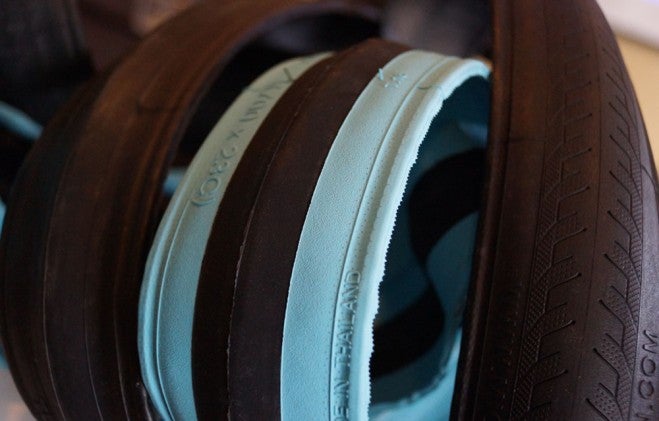Michelin Introduces Four New Pro4 Tires

Photo: Lennard Zinn | Velonews.com
Michelin introduced the Pro4 platform last year with a single tire, designated “Service Course.” On Thursday at an event at the Sebring International Raceway, Michelin introduced four new members of the Pro4 family, each with unique characteristics and a lot of Michelin technology built into them.
The change from the Pro3 to the Pro4 Service Course was in the tread and was aimed improving both durability and grip, two parameters generally considered to be impossible to improve simultaneously. Improving grip generally means a softer tread compound, which wears faster, or vice versa. What Michelin did to improve both, however, was to change both the tread compound and the overall tread shape. The Pro4’s bi-compound silica and elastomer compound is tougher than that of the Pro3, and the tread shape is pointier. Both tires have smooth tread, but the taller tread profile means that when the tire is leaned over, the tire contact patch is wider. And the tougher compound wears longer. Voilá: both parameters improved.
Michelin Pro4 Comp
The change from the Pro4 Service Course to the Pro4 Comp is strictly in the casing. The Pro4 Service Course has the same 110tpi (threads per inch) nylon casing as the Pro3, but the Pro4 Comp has a thinner, more supple 150tpi, which brings the tire’s weight down from 200 grams to 180g while adding suppleness. Michelin’s tests indicate that the Pro4 Comp has seven-percent lower rolling resistance than the Pro4 Service Course.
Michelin claims that no other tire company has managed to make a 150tpi nylon casing before, and it is very complex to do so. The threads are so thin that it says that pressing rubber into the casing strung on the loom-like “calender” machine used to make most tire casings is a challenge. As a point of reference for those used to the 280-320tpi thread counts common on cotton or cotton/poly casing tubulars and open tubulars, those casings are not made on a calender and the entire tire is not molded and vulcanized like a standard clincher (which the Pro4 is). Rather, those tubular casings are made by winding the cotton or cotton-poly threads around a drum and painting liquid latex onto them. The casing is folded over itself on a bias (so are standard clincher casings) so that the two layers of threads run at 90 degrees to each other, and then it is stitched into a tube shape (tubular) or placed on a drum where beads are added (open tubular). The tread is molded and vulcanized and then hand-glued on.
Since the tread and the high-density woven puncture-protection strip under it are the same on the two tires, Michelin claims that riders will get similar durability out of the Pro4 Comp as out of the Pro4 Service Course. Of course, the 150tpi casing is thinner, because each strand of thread in it is thinner in order that 150 of them can be lined up next to each other in an inch, rather than just 110 of them. So the casing will be more delicate and less resistant to sidewall damage. On the other hand, a nylon casing is impervious to rotting, which can plague supple cotton tubulars and open tubular clinchers, and nylon is a tougher fabric in general than cotton. At 150tpi, Michelin claims its nylon casing approaches the suppleness and low rolling resistance of a 300tpi cotton casing.
The price goes up by $5 from the Pro4 Comp to the Pro4 Service Course — from $74.99 to $79.99 — and it is available now.
Learn about the other three tires introduced at Velonews.com.